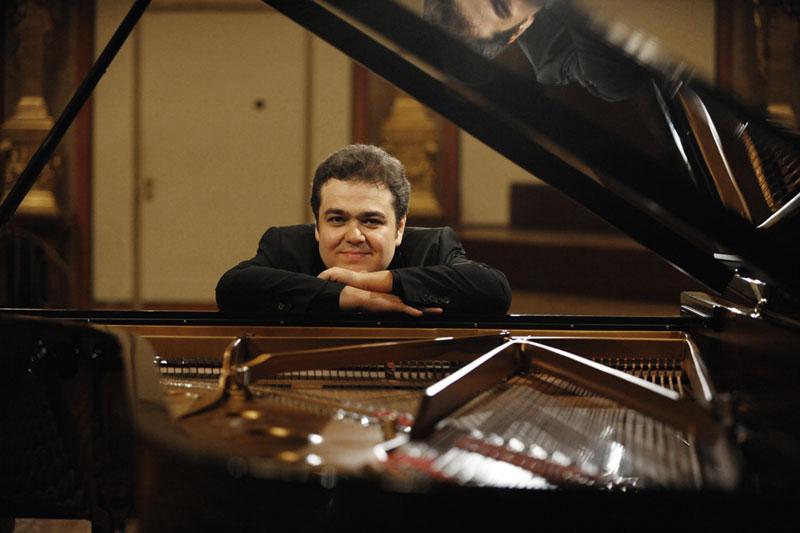Arcadi Volodos is a relatively rare visitor to London these days. Although the Russian pianist, 42, rose early to fame, his development has perhaps taken him in a direction that startles those who were initially seduced by the astounding virtuoso transcriptions – many of them his own – in which he initially established his reputation.
Anyone hoping for a taste of those at his Royal Festival Hall recital last night had to wait until his third encore. This programme had a very different focus, one that could scarcely have been more intimate and pure-hearted: an early Schubert sonata, Brahms’s late Klavierstücke Op 118, and a second half devoted to Schumann’s Kinderszenen and C major Fantasy.
Inner voices leapt out of dark corners to suitably unsettling effect
But first of all, there is that sound. What a sound it is. Volodos can produce a tone – whether at impassioned heights or more hushed than we’d have imagined a concert grand piano could be – that is as gorgeously cushioned, aerated and enveloping as a goose-feather duvet: you feel you could simply sink into it and keep on sinking. He creates extraordinary, hypnotic atmospheres. Far from prioritising projection, he instead draws the listener with him towards a hushed, sublime universe in which at times you can scarcely breathe for fear of missing a single overtone.
Schubert’s early C major Sonata D279 and the Allegretto D346 that forms its finale seemed, though, an odd choice of opener. The sepia-toned clarity and polish of Volodos’s playing could not quite compensate for the piece’s limited interest; moments of Schubertian inspiration exist, but one tendency that Volodos showed on various occasions through the evening was an inclination to play repetitive phrases the same way whenever they recurred, which did little to help him or Schubert here.
The Brahms Op 118 pieces were another matter altogether. He brought to these often magisterial and introverted pieces a surprisingly mercurial slant, thinking in long lines that flowed across many phrases, drawing out progressions and thematic links that in other hands might be subsumed into the textures, particularly so in the elusive No 4 in F minor. The much-loved A major Intermezzo felt cherished, while in the closing E flat minor Intermezzo he admitted few rays of light into the darkest of Brahms’s late soundscapes.
Schumann’s Kinderszenen are not so much pictures of childhood as the adult composer’s reflections on, possibly, the childlike qualities that Clara Wieck (with whom he was deeply in love) remarked that she saw in him. Volodos’s interpretation seemed to observe the proceedings from a great distance. "Träumerei", at the centre of the cycle, seemed a rapt sibling to the Brahms Op 118, and the poet’s speech in the final movement was exquisite enough to be a visitation from the ghost of Goethe, yet the rest was oddly devoid of charm and real, communicative intimacy. Again the pianist’s tendencies towards repetitive phrasing kept too many of the pieces somewhat boxed in (for instance, that little rubato at the top of the phrases of "Am Kamin" - "At the Fireside" - was an opportunity for variety of colour, which did not materialise). For all the concentrated atmosphere and breath-holding stillness, Volodos seemed excessively remote.
 The great C major Fantasy, though, allowed him to unfurl a treasure-trove of insights from the top of his mountain peak. The second movement’s March, in particular, was a revelation: rather than the inexorable obsessiveness of its dotted rhythms taking over for the sake of it, Volodos turned the texture into impish flickerings that, in combination with the extra-strong offbeat accents in the left hand, connected the piece to other Schumannian concepts, notably Kreisleriana’s witchy finale. Inner voices leapt out of dark corners to suitably unsettling effect. And the love song that followed was as close to heaven as one could hope.
The great C major Fantasy, though, allowed him to unfurl a treasure-trove of insights from the top of his mountain peak. The second movement’s March, in particular, was a revelation: rather than the inexorable obsessiveness of its dotted rhythms taking over for the sake of it, Volodos turned the texture into impish flickerings that, in combination with the extra-strong offbeat accents in the left hand, connected the piece to other Schumannian concepts, notably Kreisleriana’s witchy finale. Inner voices leapt out of dark corners to suitably unsettling effect. And the love song that followed was as close to heaven as one could hope.
Indeed, Volodos’s playing is that of a perfectionist whose extreme refinement could attract comparison with the ultra-polished prose of writers such as Virginia Woolf or Henry James. He cuts a slightly enigmatic figure, a presence in a space of his own as if invisibly cut off from the audience. Spontaneity is distinctly sidelined and, crucially, the extra emotional connection – which one longs for so that the music-making can be truly moving – remains somehow elusive.
Still, looking almost surprised by the ecstatic response he received, he was generous with his encores: Schumann’s "Bird as Prophet" kept up the raptness of the Fantasy, as did a short, exquisite miniature by Mompou, before he unleashed a virtuoso feast of a Falla Spanish Dance transcription and a suitably gem-like Bach Sicilienne.














Add comment